Plymouth is Abel; Jamestown is Cain
The Pilgrims laid the seed of north as Abel and freedom, and Virginia was the seed
of the south and slavery. America was split in two. America is a blend of religious and
secular. The core values of America and the reason for her great freedom and wealth comes
from the religious foundation laid by the Pilgrims. The problems of America stem from the
secular foundation laid by those who came for personal, secular, selfish, and
materialistic goals.
Pilgrims
The Pilgrims were not cold, anemic plaster saints as legend has represented them to
be. They were passionate rebels boldly declaring their independence. They were not meek
and soft-spoken but intense fighters for their cause. They put their lives on the line for
what they believed in. They were restless and impatient with the old world. They were even
reckless in action — many times embarking on desperate adventures. And they would not
let anyone or anything divert them from their course.
Legend is also wrong in portraying the Pilgrims 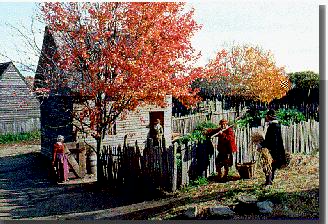 always dressed in black. Only on Sunday did they wear blacks and
grays. Usually they wore bright Lincoln green and rich russet browns that the English
lower class wore. The Pilgrims were not educated people. They did not have college
degrees. The Pilgrims were revolutionaries whose goal was to implant Protestantism in
America.
always dressed in black. Only on Sunday did they wear blacks and
grays. Usually they wore bright Lincoln green and rich russet browns that the English
lower class wore. The Pilgrims were not educated people. They did not have college
degrees. The Pilgrims were revolutionaries whose goal was to implant Protestantism in
America.
They stood firm against persecution, poverty, death, hunger, disease, Indian alarms,
difficulties with their business partners, ignorance of the wilderness and heartbreaking
setbacks.
William Bradford
Bradford became a Christian when he was twelve years old. He started associating
with the Puritans and began his "holy, prayerful, watchful, and fruitful walk with
God."
Every member of his family violently opposed his associating with
"heretics." They warned him he would lose everything — his good name, the
land he had inherited from his father, and ultimately, his very soul. But Bradford never
wavered under "the wrath of his uncles, nor the scoff of his neighbors." He
joined a small group of "Separatists" who met secretly every Sunday. The
persecution became so intense the congregation of 120 members
decided to flee to Holland where they had heard there was "freedom of religion for
all men." Bradford arrived in Amsterdam with only the shirt on his back. Since they
were farmers and had no skills they could only get low paying jobs in the city.
To set up a church separate from the Church of England was regarded as treason. Some
Separatists were executed.
Jail
Bradford and Brewster and others had been imprisoned in a jail in
Boston, England. It is common for God’s chosen people, His champions, to go to
jail. Jesus and his disciples were. Thomas Aquinas was kidnapped by his
parents because he joined what they thought was a cult in the Middle Ages and held for a
year before they gave up. Mormons were jailed and beaten. Rev. Moon has been jailed
6 times. The jail where Bradford and Brewster stayed is open for tourists. I've
included a picture of it here. 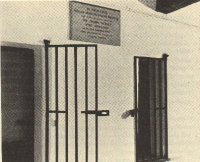
The other pictures seen here are God's champions in jail. The drawing is from a
children's book of Bible stories that show Joseph in jail because the Pharaoh's wife was
angry that he would not have sex with her.

Martin Luther King was arrested, handcuffed and jailed. 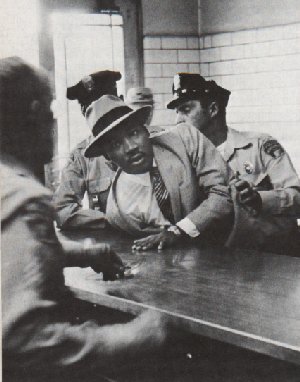
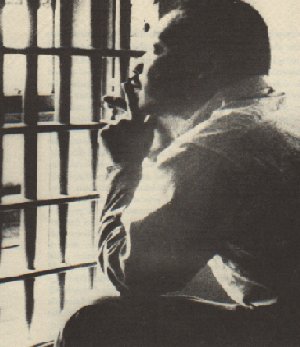
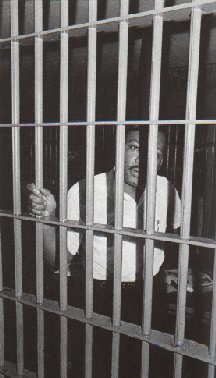 The picture that looks like a
house is the
The picture that looks like a
house is the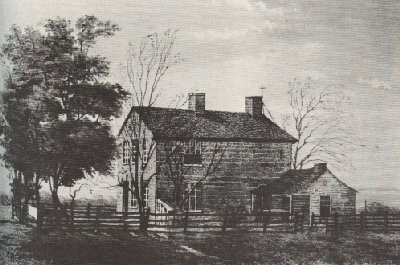
place where Joseph Smith was jailed and then shot by a mob. 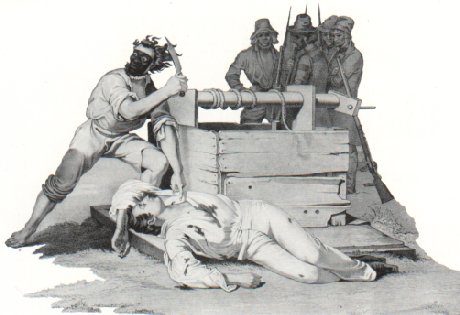
Rev. Moon is seen in his cell at a Federal Prison in Danbury, Connecticut.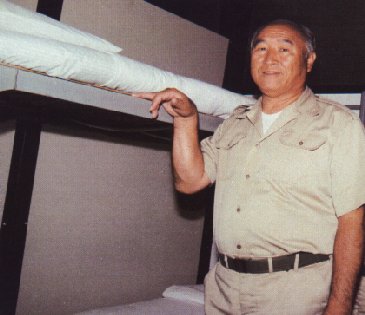 The list of good men of
God who have not been seen as good by governments and juries is a very long list.
Jesus was jailed and then received capital punishment for being a dangerous rebel rouser
who wanted to overthrow the state. St. Paul and countless others like Roger
Williams, George Fox and John Wesley have been jailed, run out of town and stoned by
emotional people who were scared to death to hear something new and challenging.
Schools and parents should teach that force should never be used against another just
because they believe differently than the majority. But persuasion is to
tolerated. Even if it seems offensive.
The list of good men of
God who have not been seen as good by governments and juries is a very long list.
Jesus was jailed and then received capital punishment for being a dangerous rebel rouser
who wanted to overthrow the state. St. Paul and countless others like Roger
Williams, George Fox and John Wesley have been jailed, run out of town and stoned by
emotional people who were scared to death to hear something new and challenging.
Schools and parents should teach that force should never be used against another just
because they believe differently than the majority. But persuasion is to
tolerated. Even if it seems offensive.
The argument by some who write against Rev. Moon and those who use force against him
that he is using mind control is ludicrous. That would make Sunday morning
commercials for sugary cereals for kids a diabolical plot to brainwash kids to make some
fat capitalist rich. America has got to stop trying to regulate everything.
It's o.k. for Democrats to say Republicans are dangerous, mean, uncaring greedy country
club capitalists and for the Republicans to call Democrats a bunch of nazi communist
liberals. Both feel the other is some nightmare that must be stopped. But it
is not o.k. for anyone to stop them from recruiting people by use of persuasion. We
can't call prime time ads blasting politicians for being heartless and ruining America as
"coercive persuasion." Consenting adults have the right to do as they
wish. It is all right for anyone to criticize Playboy magazine for corrupting the
morals of America. But it is not all right to use government to forcefully ban them
as some well meaning conservatives keep trying to do. Playboy is not using
force. It is using advertising. It is aggressively using persuasion. But
it is not any more coercive than Rev. Moon's followers or those obnoxious ads for
furniture companies on tv. I go into more detail on this in my book Unification
Church, an apology.
The Pilgrims were different, critical of the status quo and refused to act like
normal people so they were seen as a threat to law and order. King James threatened
the Pilgrims, "I will put down this Puritan devil even if it cost me my crown. I
shall make them conform or I shall harry them out of the land – or worse." The
Pilgrims and the Puritans were Abel and the Church of England was Cain. Because it
persecuted the Pilgrims, England was destined to decline, and America would rise as
God’s blessings shifted from England to America.
Pilgrims - a cult
The Pilgrims were what today would be called a cult. William Bradford was 12
years old when he was witnessed to by a member of this "cult." He went
with his new friend to a meeting and joined immediately. He was an orphan who was
being raised by his two uncles. They violently objected to him associating with
radicals. But Bradford was like a rock and soon moved in with the Brewster
family. William Brewster treated him like a son. They would remain best of
friends until Brewter's death 40 years later.
These Pilgrims, like all "cult members," have guts. They were looked
upon as being dangerous. They were spied on, arrested, and jailed.
It is a myth that the pilgrims did not enjoy life. They were very religious
people with a high moral code, but they also relished family, friendship, work, food,
music and singing. They were passionate, but disciplined people from the lower or
lower middle class. They were simple people - most were illiterate farmers.
Bradford was self-educated. He loved books and even studied latin, greek and hebrew
so he could understand the scriptures better by reading them in their original instead of
through translation.
Bradford begins his journal, the neglected classic, Of Plymouth Plantation,
by saying, "I shall endeavor to manifest in plain style ... the simple truth in all
things." The Church of England was the state church and the religious
leaders used the power of the state to crush any other religious views. Bradford
writes that his group, called the Separatists, broke away so "that truth prevail and
that the churches of God revert to their ancient purity, and recover their primitive
order, liberty and beauty."
The authorities were angered at their noncomformity and used "tyrannous power,
to persecute the poor persecuted church ... [yet] it was most needful that the fundamental
points of religion be preached in those ignorant and superstitious times." The
result, he said, was that "Religion hath been disgraced, the godly grieved,
afflicted, persecuted, and many exiled. Sundry have lost their lives in prisons and
other ways."
"At this day the man or woman that begins to profess religion and to serve God,
must resolve himself to sustain mocks and injuries even as though he lived amongst the
enemies of religion." He says that when "godly and zealous preachers"
converted people by "travail and diligence" and helped these new converts to
become "enlightened by the Word of God, and had their ignorance and sin discovered
unto them, and began by His grace to reform their lives" these new believers were
immediately "both scoffed and scorned."
Pay the price
He wrote that they spent years "with much patience" and "with
heavenly zeal for His truth ... as the Lord's free people" doing their best to
"walk in all His ways" and to keep fellowship together. But it was hard.
He says, "And as it cost them something this ensuing history will
declare." This is a lesson in perseverance. Religion and politics are
very emotional topics. God wants Christians to witness. That means to
carry a cross. It means we must upset people with new ideas. We have to
pay the price. There is a "cost." And for so many in human history,
like the Pilgrims, the cost is extremely high.
He wrote that "After these [harassments] they could not long continue in any
peaceable condition, but would be hunted and persecuted on every side." After
Brewster lost his government job and many suffered other attacks because they
couldn't keep their meetings secret, they decided to go to Holland, where there was
an amazing thing - freedom of religion. In all of human history this was rare.
God was again helping the Pilgrims as much as Satan was trying to kill them.
Patriarch
Bradford is a true hero, a great role model, a great patriarch. As one writer
said, he "was indeed a gifted leader of unusual inspiration, kindliness, and
acuteness, a devout religionist to be sure, but a thinker as well as a doer."
He cared for all people, even Indians. He was Christ like. He was even 30
years old when he landed at Plymouth to become the true spiritual ancestor of America.
He voraciously read the Bible at twelve. As a teenager, he wrote to his uncles
saying that if he was taking an "ungodly" course that could endanger his life or
make him lose his inheritance of land from his father's estate that he would receive at
the age of 18 then they would be giving good advice. But he told them he was taking a
godly course and has made his decision in his "calling" very carefully, and he
will never change his mind. He wrote to them saying, "Were I to endanger my
life or consume my estate by any ungodly courses, your counsels to me were very
seasonable; but you know that I have been diligent and provident in my calling."
Young people
The pattern throughout history is that when a new messenger from God appears, it is
often young people who accept the new and improved truth easier than their parents.
This is logical. We all get into habits. And as we get older we get set in our
ways. We find comfort in ritual and tradition. The problem is that people get
in a fog mentally. Satan puts people to sleep. People are usually
intellectually and emotionally lazy. It is just too much to get out of their comfort
zone and stretch. We all want to feel secure in our beliefs, but it is dangerous to
relax. Jesus said carry a cross, not eat and drink like the people did at the
time of Noah. We are always at war with Satan. Satan blinds us to this.
God's messengers sound military like. Jesus was a fanatic. Billy Graham
would be aghast if he saw him. People, over time, water down the founders of
religions. Jesus is now seen as a quiet pacifist who plays with children and
sheep. The truth is that he scared the hell out of people. He was loud and
tough. In other words he was like Sun Myung Moon. The religious leaders hated
him. He was absolutely the last thing they thought the Messiah would be like.
But people, thanks to Satan who rules this world with a vengeance, forget that God always
works in miraculous ways.
Who do you think would accept Sun Myung Moon as the messiah first? Young
people of college age or Billy Graham and Jerry Falwell? How easy is it for the Pope
to hear from Rev. Moon that it is time for the Pope and all the priests and nuns to get
married. In fact he will a mate for them himself!
Jesus brings "sword" of truth
Bradford was young and open to new truth. His guardians weren't. Jesus
spoke in military terms saying that anyone who follows him will lose their family because
not everyone accepts the truth all at once. Jesus said, "Do not think that I
have come to bring peace on earth; I have not come to bring peace, but a
sword." The Divine Principle explains that Jesus was using a sword to symbolize
truth. Even so the truth cuts like a sword, doesn't it?
He goes to say, "Whoever loves father or mother more than me is not worthy of
me; and whoever loves son or daughter more than me is not worthy of me; and whoever does
not take up the cross and follow me is not worthy of me. Those who find their life
will lose it, and those who lose their life for my sake will find it" (Matt. 34-39).
Religion is heavy. God's way of life is scary. Bradford chose to lose
his life for Christ's sake.
It take a few pioneers to break the ice before the ship can go through. It's a
dirty job, but some have to do it. It is easier for some than others. Bradford was a
historical pioneer.
Bradford's cross
When he was a teenager, Bradford wrote to his Uncles saying that he deeply
wished they would accept him, but if they won't, and they separate, it will hurt "as
great as a cross ... Nevertheless, to keep a good conscience, and walk in such a way as
God has prescribed in His word, is a thing which I must prefer before you all, and above
life it self...."
George Washington and his mother
There are countless examples of families torn apart because of ideological
differences. Many brothers fought against each other in America's civil war.
Many parents have suffered because their children chose another church or lifestyle.
Let's look at one example. The founder of America is George Washington. 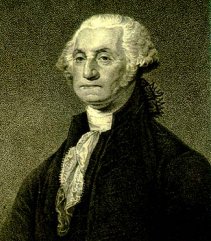 He is considered the greatest
American - the father of America.
He is considered the greatest
American - the father of America.
What was his relationship with his parents. His father died and his mother
Mary 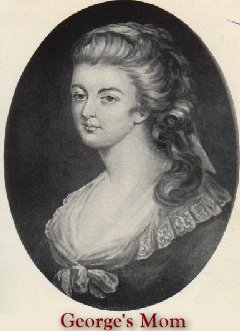 never could see that
her son was a great man. In Washington: A Biography by Noemie Emery we read
that she was a "troubled woman" who "fretted" about "unnamed
anxieties that centered on a desire to possess property ... and to possess her children.
... Later her letters would ring an endless complaint -- 'No corn in the corn-house ... I
should be almost starved.... I never lived so poor in my life' hinging on the common
themes of privation, insufficiency, and loss." She was both
"impressive and disturbing, intense in her preoccupations, backing her hesitant
decisions with unchanging tenacity of will."
never could see that
her son was a great man. In Washington: A Biography by Noemie Emery we read
that she was a "troubled woman" who "fretted" about "unnamed
anxieties that centered on a desire to possess property ... and to possess her children.
... Later her letters would ring an endless complaint -- 'No corn in the corn-house ... I
should be almost starved.... I never lived so poor in my life' hinging on the common
themes of privation, insufficiency, and loss." She was both
"impressive and disturbing, intense in her preoccupations, backing her hesitant
decisions with unchanging tenacity of will."
To her children "she showed all her life an inability to take pleasure in their
achievements or their company or to recognize them in any way as personalities with
identities and troubles of their own. Her total lack of interest in the honors that
deluged her oldest child [George] (which she lived to see, dying in 1789) is a peculiar
chapter, 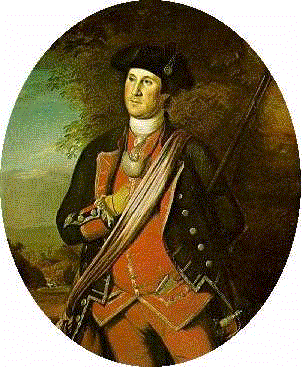 but her sense of
pleasure was as raddled as her eye for pain was keen. But her awareness of the
rights of was always shadowy at best. She wrote George, on campaign in the wilderness, for
a Dutchman and butter, and her response to his travail in the Revolution was to dun him
with complaints about her money troubles and finally to petition the legislature of
Virginia for relief." She embarrassed Washington.
but her sense of
pleasure was as raddled as her eye for pain was keen. But her awareness of the
rights of was always shadowy at best. She wrote George, on campaign in the wilderness, for
a Dutchman and butter, and her response to his travail in the Revolution was to dun him
with complaints about her money troubles and finally to petition the legislature of
Virginia for relief." She embarrassed Washington.
He wrote to his mother once trying to educate her on a simple truth saying:
"'Happiness depends more on the internal frame of a person's own mind than on the
externals of the world.' But Mary, who had no acquaintanceship with happiness, was
not about to form one now."
Washington's feelings for his mother was one of "ambivalence: in childhood he
was withdrawn; in youth, resistant; in maturity, resigned. His correspondence with
(and about) his mother reveals no emotion, except exasperation (and perhaps a saddened
tolerance); his visits to her after childhood were infrequent, reluctant, unrewarding, and
short. The conclusions to be drawn from this are inescapable; that he moved, as soon as it
was in his power, to sever, or at any rate reduce, a connection that had brought him
little comfort and a high degree of strain."
Champions of God, like Washington and Bradford, often have parents who drain
people. Parents just can't get it sometimes. In Washington: The
Indispensable Man, James Thomas Flexner, writes: "Their relationship had always
been stormy. Mary Ball Washington's attitudes towards her son's activities in the
French and Indian War and in the Revolution had been the same: he was meddling in matters
that should not concern him to the neglect of his duty to her. Although he had set
her up in a small house at Fredericksburg and seen that she was well supplied with money
and goods, she had embarrassed him, when he was away as commander in chief, by complaining
'upon all occasions and in all companies' that she was neglected, left 'in great
want.' She even initiated a movement in the Virginia legislature whereby the state
would come to the financial rescue of the mother of the Commander in Chief.
Washington found her action extremely humiliating and squashed it.
Like so many people, his mother was obsessed with money. Fallen man clings to
it. Those who fight for God's new messengers often don't have any or give it away or
risk it all for their crusade. This drives the average parent out of their
trees. For example, many parents of Unification Church members kidnapped their
children because they felt they were brainwashed by some oriental con artist who only
wanted their money.
Washington's mother 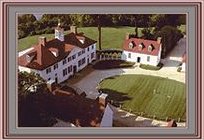 is like so many who are obsessed with money. We read, "After the war, her
demands for money became so oppressive and annoying that Washington suggested that she
sell her house and live with one of her children. He quickly added that this was not
an invitation to Mount Vernon." So, whenever you see a picture of this house
which is probably the most famous in America, ponder on the fact that the owner did not
want his mother to come there.
is like so many who are obsessed with money. We read, "After the war, her
demands for money became so oppressive and annoying that Washington suggested that she
sell her house and live with one of her children. He quickly added that this was not
an invitation to Mount Vernon." So, whenever you see a picture of this house
which is probably the most famous in America, ponder on the fact that the owner did not
want his mother to come there.
Washington fought his war without the help of his mother. Bradford had to fight his
battles without his guardians. The followers of Sun Myung Moon have often had to do
the same. Their crusade is the greatest in human history. It is nothing less
than the building of a one world family. Because they say everyone will speak Korean
in that world their parents often go ballistic. Let's learn from history and be open
to what sounds like strange revelations and strange movements. Some are crazy, but
we must always be on the lookout for revolutionary truths. Jim Jones was just plain
crazy. Rev. Moon is crazy for God. If anyone looked carefully they would see
the difference.
The tiny sect that Bradford joined was called in derision by their foes, Puritans
just as Rev. Moon's movement is called in derision a cult. Bradford's movement felt
they were purifying the English Church of all vestiges of Roman Catholicism. They
saw themselves as super Protestants. They hated idleness and exalted thrift and
industry. They liked Calvin. Bradford liked John Foxe's popular work, The Book of Martyrs
(1566) which told of the persecution of Protestants from Catholics.
The Book of Martyrs
(1566) which told of the persecution of Protestants from Catholics.
When James I came to power in 1603 he increasingly persecuted them. Bradford
writes, "For some were taken and clapt up in prisons, others had their homes beset
and watched night and day, and hardly escaped their hands." They kept changing
their place of worship in an effort to escape arrest. To be arrested and jailed is
the usual course for God's champions. Even though America has a Bill of Right
saying there is freedom of religion, many have been persecuted in America.
Members of the Church of Latter Day Saints were jailed and their founder, Joseph Smith,
was murdered in Illinois. Reverend Moon was innocent as shown in Carlton Sherwood's
book Inquisition, but was jailed in America for one year at the age of 65.
Members of the Unification Church have been brutally kidnapped and abused by faith
breakers - some of whom have often never suffered jail time after they had
forcefully imprisoned others. Initiating force is not God's way. Defending
oneself is.
Pilgrims in Holland
Bradford  writes how
difficult it was to give up their home in England and move to Holland: "For these
reformers to be thus constrained to leave their native soil, their lands and livings, and
all their friends, was a great sacrifice, and was wondered at by many. But to go into a
country unknown to them, torn by war, where they must learn a new language, and get their
livings they knew not how, seemed an almost desperate adventure, and a misery worse than
death. Further, they were unacquainted with trade, which was the chief industry of their
adopted country, having been used only to a plain country life and the innocent pursuit of
farming. But these things did not dismay them, though they sometimes troubled them; for
their desires were set on the ways of God, to enjoy His ordinances; they rested on His
providence, and knew Whom they had believed."
writes how
difficult it was to give up their home in England and move to Holland: "For these
reformers to be thus constrained to leave their native soil, their lands and livings, and
all their friends, was a great sacrifice, and was wondered at by many. But to go into a
country unknown to them, torn by war, where they must learn a new language, and get their
livings they knew not how, seemed an almost desperate adventure, and a misery worse than
death. Further, they were unacquainted with trade, which was the chief industry of their
adopted country, having been used only to a plain country life and the innocent pursuit of
farming. But these things did not dismay them, though they sometimes troubled them; for
their desires were set on the ways of God, to enjoy His ordinances; they rested on His
providence, and knew Whom they had believed."
He wrote that their years at Leyden were good ones overall: "They enjoyed such
sweet and delightful society under the able ministry and wise government of Mr. John
Robinson, their minister, and Mr. William Brewster, who was made an elder of their
church. They grew in knowledge and lived together in peace and love and
holiness." He continues saying that their church grew and if there were any
disagreements between them they resolved them quickly: "Many others came to them from
England, and they made a great congregation. And if any differences came between
them or laws were broken, they were met and nipped in the bud. Those offenders that
could not be cured were sent away. But this seldom came to pass, for they had mutual love
and respect for one another."
They worked at subsistence wages. But "at length they came to raise a competent
and comfortable living, but with hard and continual labor." The men worked 12 to 14
hours a day 6 days a week.
In Holland they started a publishing house, the Pilgrim Press. King James had the
English ambassador to Holland denounce the "atrocious and seditious libels"
which were smuggled into England to aid the Separatist cause. The King tried to persuade
the Dutch authorities to arrest the publishers and smash the press. They did seize and
close down the press, and the publisher went into hiding.
They saw their children in Holland "drown away by evil examples" of
feasting and fun. Religion was central to the Pilgrims, and they wanted a purer
environment for their children.
The Pilgrims knew the statistics of death of the colony in Jamestown "but it
had not affected their resolution to settle in America."
Stepping Stones
The main reason the Pilgrims left for America was to lay the foundation for the
"Kingdom of Christ." In a memorable passage, he wrote, "a great hope
and inward zeal they had of laying some good foundation or at least to make some way ...
for the propagating and advancing of the gospel of the Kingdom of Christ in these remote
parts of the world. Yea, though they should be but even as stepping stones unto
others for the performance of so great a work." They were God's chosen people
who had a dream and would let no one take it away from them.
Pilgrims - not perfect
The Pilgrims were not perfect. Like any group, there are
varying degrees of commitment and morality. But as a whole, they were an extraordinary
group. Still, they made a great mistake when they did not see that God wanted them to
reject Calvinism and accept Arianism (explained earlier in this chapter). One book
says, "If the Pilgrims could have remained in prosperous, easy-going Amsterdam ...,
they would have flourished materially. Practically all sects were free to teach
their peculiar tenets, but the Pilgrims feared their church might split doctrinally....
Daily contact with Anabaptists, Socinians, Arians, Jews and miscellaneous heretics and
unbelievers threatened their own tight orthodoxy. Hence they decided to
leave." They moved to another city, Leyden, but they should have become Arians
and started America off on a true view of Jesus.
70 investors
In 1617, after 12 years of living in exile in Holland, they finally decided 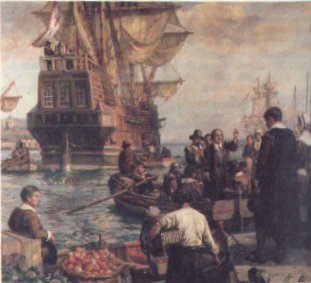 to go to America. There was a 3
year preparation and in 1620 they sailed. To finance the trip they needed a lot of money
and some help from investors. Bradford sold all he had. They threw in with a
man named Thomas Weston who offered to raise money in England for them. One book
says, "Businessmen in England at that time were often called merchant
adventurers. They made up a growing class of people who were getting rich in
industry and trade. They invested their money in new business ventures in order to
make a profit."
to go to America. There was a 3
year preparation and in 1620 they sailed. To finance the trip they needed a lot of money
and some help from investors. Bradford sold all he had. They threw in with a
man named Thomas Weston who offered to raise money in England for them. One book
says, "Businessmen in England at that time were often called merchant
adventurers. They made up a growing class of people who were getting rich in
industry and trade. They invested their money in new business ventures in order to
make a profit."
"Weston pulled together 70 merchant adventurers who agreed to
back the Separatists' project. They did not share the religious views of the
Separatists. It was the idea of a quick profit from a colony in America that interested
them." They drew up a 7 year contract. The Pilgrims had many differences
with Weston and the 70 venture capitalists. One book says, "Much of Bradford's History
of Plymouth Plantation is taken up with how miserably the adventurers used the
Pilgrims." Bradford wrote, "Thus were they [the Pilgrims] abused in their
simplicity." Religious pioneers are often not so sophisticated with money and secular
society often takes advantage of them.



 always dressed in black. Only on Sunday did they wear blacks and
grays. Usually they wore bright Lincoln green and rich russet browns that the English
lower class wore. The Pilgrims were not educated people. They did not have college
degrees. The Pilgrims were revolutionaries whose goal was to implant Protestantism in
America.
always dressed in black. Only on Sunday did they wear blacks and
grays. Usually they wore bright Lincoln green and rich russet browns that the English
lower class wore. The Pilgrims were not educated people. They did not have college
degrees. The Pilgrims were revolutionaries whose goal was to implant Protestantism in
America. 



 The picture that looks like a
house is the
The picture that looks like a
house is the

 The list of good men of
God who have not been seen as good by governments and juries is a very long list.
Jesus was jailed and then received capital punishment for being a dangerous rebel rouser
who wanted to overthrow the state. St. Paul and countless others like Roger
Williams, George Fox and John Wesley have been jailed, run out of town and stoned by
emotional people who were scared to death to hear something new and challenging.
Schools and parents should teach that force should never be used against another just
because they believe differently than the majority. But persuasion is to
tolerated. Even if it seems offensive.
The list of good men of
God who have not been seen as good by governments and juries is a very long list.
Jesus was jailed and then received capital punishment for being a dangerous rebel rouser
who wanted to overthrow the state. St. Paul and countless others like Roger
Williams, George Fox and John Wesley have been jailed, run out of town and stoned by
emotional people who were scared to death to hear something new and challenging.
Schools and parents should teach that force should never be used against another just
because they believe differently than the majority. But persuasion is to
tolerated. Even if it seems offensive.  He is considered the greatest
American - the father of America.
He is considered the greatest
American - the father of America.  never could see that
her son was a great man. In Washington: A Biography by Noemie Emery we read
that she was a "troubled woman" who "fretted" about "unnamed
anxieties that centered on a desire to possess property ... and to possess her children.
... Later her letters would ring an endless complaint -- 'No corn in the corn-house ... I
should be almost starved.... I never lived so poor in my life' hinging on the common
themes of privation, insufficiency, and loss." She was both
"impressive and disturbing, intense in her preoccupations, backing her hesitant
decisions with unchanging tenacity of will."
never could see that
her son was a great man. In Washington: A Biography by Noemie Emery we read
that she was a "troubled woman" who "fretted" about "unnamed
anxieties that centered on a desire to possess property ... and to possess her children.
... Later her letters would ring an endless complaint -- 'No corn in the corn-house ... I
should be almost starved.... I never lived so poor in my life' hinging on the common
themes of privation, insufficiency, and loss." She was both
"impressive and disturbing, intense in her preoccupations, backing her hesitant
decisions with unchanging tenacity of will."  but her sense of
pleasure was as raddled as her eye for pain was keen. But her awareness of the
rights of was always shadowy at best. She wrote George, on campaign in the wilderness, for
a Dutchman and butter, and her response to his travail in the Revolution was to dun him
with complaints about her money troubles and finally to petition the legislature of
Virginia for relief." She embarrassed Washington.
but her sense of
pleasure was as raddled as her eye for pain was keen. But her awareness of the
rights of was always shadowy at best. She wrote George, on campaign in the wilderness, for
a Dutchman and butter, and her response to his travail in the Revolution was to dun him
with complaints about her money troubles and finally to petition the legislature of
Virginia for relief." She embarrassed Washington.  is like so many who are obsessed with money. We read, "After the war, her
demands for money became so oppressive and annoying that Washington suggested that she
sell her house and live with one of her children. He quickly added that this was not
an invitation to Mount Vernon." So, whenever you see a picture of this house
which is probably the most famous in America, ponder on the fact that the owner did not
want his mother to come there.
is like so many who are obsessed with money. We read, "After the war, her
demands for money became so oppressive and annoying that Washington suggested that she
sell her house and live with one of her children. He quickly added that this was not
an invitation to Mount Vernon." So, whenever you see a picture of this house
which is probably the most famous in America, ponder on the fact that the owner did not
want his mother to come there.  The Book of Martyrs
(1566) which told of the persecution of Protestants from Catholics.
The Book of Martyrs
(1566) which told of the persecution of Protestants from Catholics.  writes how
difficult it was to give up their home in England and move to Holland: "For these
reformers to be thus constrained to leave their native soil, their lands and livings, and
all their friends, was a great sacrifice, and was wondered at by many. But to go into a
country unknown to them, torn by war, where they must learn a new language, and get their
livings they knew not how, seemed an almost desperate adventure, and a misery worse than
death. Further, they were unacquainted with trade, which was the chief industry of their
adopted country, having been used only to a plain country life and the innocent pursuit of
farming. But these things did not dismay them, though they sometimes troubled them; for
their desires were set on the ways of God, to enjoy His ordinances; they rested on His
providence, and knew Whom they had believed."
writes how
difficult it was to give up their home in England and move to Holland: "For these
reformers to be thus constrained to leave their native soil, their lands and livings, and
all their friends, was a great sacrifice, and was wondered at by many. But to go into a
country unknown to them, torn by war, where they must learn a new language, and get their
livings they knew not how, seemed an almost desperate adventure, and a misery worse than
death. Further, they were unacquainted with trade, which was the chief industry of their
adopted country, having been used only to a plain country life and the innocent pursuit of
farming. But these things did not dismay them, though they sometimes troubled them; for
their desires were set on the ways of God, to enjoy His ordinances; they rested on His
providence, and knew Whom they had believed."  to go to America. There was a 3
year preparation and in 1620 they sailed. To finance the trip they needed a lot of money
and some help from investors. Bradford sold all he had. They threw in with a
man named Thomas Weston who offered to raise money in England for them. One book
says, "Businessmen in England at that time were often called merchant
adventurers. They made up a growing class of people who were getting rich in
industry and trade. They invested their money in new business ventures in order to
make a profit."
to go to America. There was a 3
year preparation and in 1620 they sailed. To finance the trip they needed a lot of money
and some help from investors. Bradford sold all he had. They threw in with a
man named Thomas Weston who offered to raise money in England for them. One book
says, "Businessmen in England at that time were often called merchant
adventurers. They made up a growing class of people who were getting rich in
industry and trade. They invested their money in new business ventures in order to
make a profit."